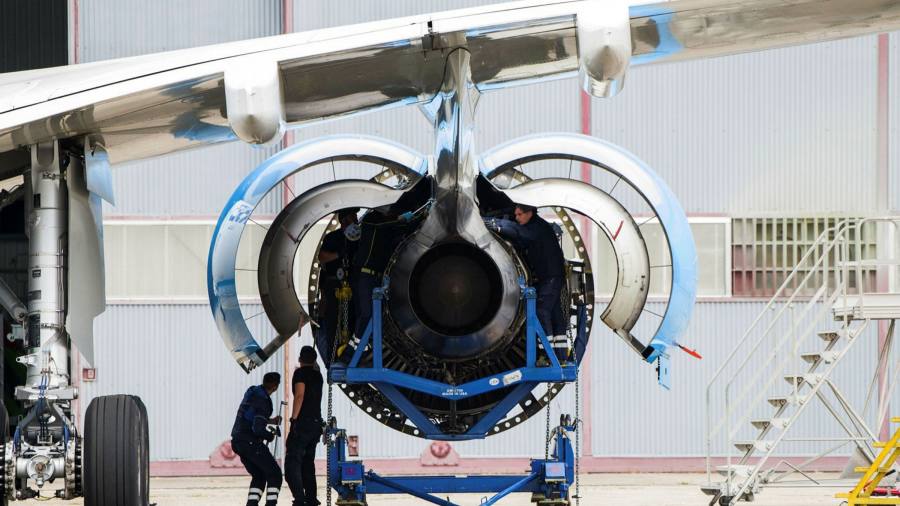[ad_1]
Rolls-Royce is planning to temporarily close its jet-engine factories for two weeks this summer to preserve cash, marking the first time it has been forced into such a drastic move since it became a listed company in the 1980s.
The aero-engine maker is consulting unions and employee representatives at its civil aerospace division, which manufactures jet-engine parts, about how the shutdowns will work as it cuts costs to cope with a prolonged collapse in the aviation market arising from the coronavirus pandemic.
The division employs 19,000 staff globally in countries including Germany and Singapore, although the majority — 12,500 — are based in the UK.
Rolls-Royce has also started talks with British unions about a separate target to deliver a permanent 10 per cent improvement in productivity and efficiency at its UK civil aerospace operations. These are predominantly focused on its historic engine production facilities in Derby, but also include smaller sites in Solihull, Tyne and Wear and Glasgow.
As reported by the Financial Times last year, staff were first warned of possible temporary plant closures in October. The company has now refined its plans concerning a two-week shutdown in the summer, although exact dates are yet to be finalised.
Rolls-Royce confirmed it was the first time since the 1980s that it had taken such action to cut costs, although the factories routinely close over Christmas and its UK operations were paused for a week last spring while the company introduced measures to comply with Covid-19 guidance.Â
It acknowledged the shutdowns would be “disappointing to our colleaguesâ€, but said it intended to reduce the impact on their pay by spreading reductions across the year.
Rolls-Royce is among the companies that has been making use of the UK government’s furlough scheme since it was launched last year, but said it would not tap the job retention scheme to cover the two-week closures if it were extended by British chancellor Rishi Sunak. The furlough scheme is due to end in March.
The group has been grappling with how to ride out the deep and protracted slump in aviation demand since the first wave of coronavirus lockdowns. It last year announced it would make at least 9,000 job cuts from its 52,000-strong workforce to save £1.3bn annually by the end of 2022, about 8,000 of which would be at the civil aerospace division. So far it has made about 7,000 redundancies against that 9,000 target.
In January the company warned that cash outflows this year would be worse than investors and analysts had been expecting as new Covid-19 variants extended the crisis in global aviation.
Rolls-Royce declined to comment on what measures might be involved in the long-term 10 per cent productivity and efficiency gains but said it had “now begun complex and constructive discussions with the union on how this can be achievedâ€.
News of the two-week summer shutdown was first reported by The Sunday Telegraph newspaper.
Chief executives from three of the UK’s biggest airports on Sunday spelt out the crisis engulfing the aviation sector, claiming Heathrow, Gatwick and Manchester were collectively losing about £50m a week as passenger numbers have slumped but their fixed costs such as business rates and policing have remained the same.
In an article for the Mail on Sunday newspaper, Charlie Cornish, John Holland-Kaye and Stewart Wingate, the chief executives of Manchester, Heathrow and Gatwick airports respectively, pleaded for more target financial support for the sector.
They called on the chancellor to redistribute some of the £1.8bn that has been returned to the government by UK supermarkets in “unnecessary business rate alleviationâ€, arguing “most of the costs of running an airport cannot be turned off or turned downâ€.
[ad_2]
Source link





